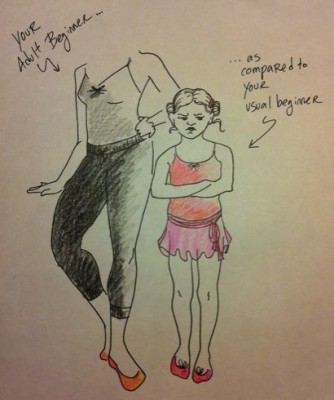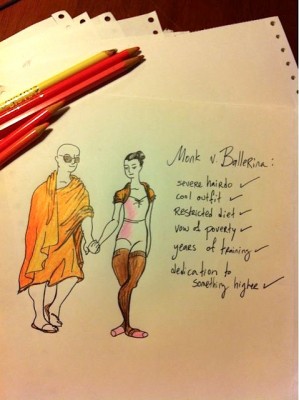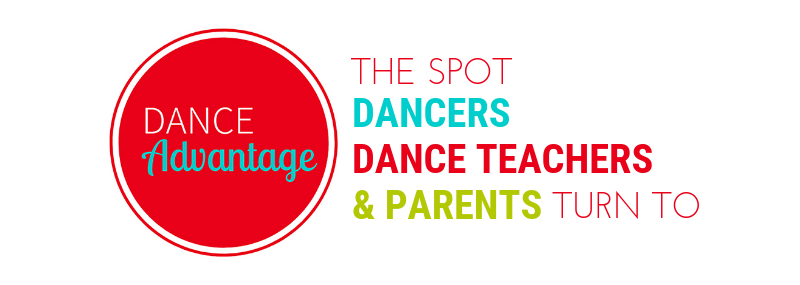Yesterday, I published Chapter 1 of my chat with bloggers Dave of DaveTriesBallet.com and Ms. Adult Beginner (adultbeginner.wordpress.com). If you haven’t read that yet, I suggest you click right here because you don’t want to miss how this lady and gent got started in ballet, which one is performing after only a few months of study, and you know, other witty banter.
No? You’re sticking. Okay, here goes Chapter Two…
Nichelle: How often do you take classes per week and is it important to have a studio that allows some schedule flexibility or is it easier for you to have a consistent class time?
Dave: I’m in a reasonably nice position as I am in graduate school and so have a fairly flexible schedule. I have lectures I can’t miss, but can work around my other commitments. That being said, I like to have set class times that I can get into a routine. I currently take two classes during the week, each 1.25 hours in the evening. Then on a Saturday I head into New York and take 3 classes (total 4 hours) in a row, with an hour break after the second class. I will now also have a 2 hour rehearsal every Friday night for Coppelia. I would love to take more classes, but I don’t think my schedule (or bank balance!) will allow it.
AB: Your ballet schedule is Wow! I take class twice a week, sometimes three times, and I want zero flexibility in class time. A well scheduled class is one that I don’t have to check on and confirm.
Class with my first teacher was dependent on attendance, and I hated not knowing in the morning if class was on or not for that evening.
What most surprised you about ballet classes once you got started?
Dave: How physically hard it is. Today I took my three classes in New York and by the end my legs were really tired – like I’d done a hard bike ride or run. I got on the subway and felt like Barney in How I Met Your Mother when he runs the marathon and then can’t stand up to get off the subway! When one of my friends first saw a ballet she commented on the male dancers saying that it looked as strenuous as a sport, and I agree – it’s seriously hard work. But that is also one of the reasons I love it.
AB: Was thrilled that ballet teachers expect everyone to do everything correctly. Even beginners! There was none of that, “Oh, you’re not ready for full lotus, you take Shameful Half Lotus,” No! None of that! Being expected to do stuff correctly means that your teacher believes you can. Which is sweet.
Speaking of expectations, how important is it to feel pushed or challenged in your classes?
Dave: I love it when a teacher pushes or challenges me. My best class ever was just before Christmas when only three people turned up for class – me and two girls in their 20’s who had been dancing for many years. The teacher taught at their level and challenged me to do all that they were doing. I relished the challenge and in the end did some things I had never done before – like tour jetés and saut de chats. Great stuff! Even today, midway through a combination my teacher challenged me to try a double pirouette – I had never tried before and they weren’t pretty but I got around and felt proud for doing so.
AB: It’s important to do one thing well and one thing badly each class.

Oooh, well said. It’s important for teachers to provide that opportunity for their students – the accomplishment and the challenge. Motivation!
Do you (or would you) take lessons at a school which also caters to children or teens?
AB: Well, it depends. If the children are beginners too that’s fine. But- I went to a class once (and I’ve never been back to this studio) which was called Adult Beginner/Intermediate. And there were children in the class. And they were at a much higher level of ballet skill than I was. And I just barely managed not to cry in class in front of the children. It was mortifying.
Seriously, I felt stupid and awful and had that been my first class I would never have had a second. That one class could’ve killed Adult Beginner, oh noes!
Wrote a post about that experience, which ended up making me laugh, so In Your Face, Bad Class! I win!
Speaking of writing on class experiences. You’ve both touched on teaching style and what makes a good class or teacher. Good stuff. (on Dave Tries Ballet | on Adult Beginner) Ok, back to dancing with kids…
Dave: Both my schools cater for children. My weekday school is mainly kids, and our class follows the boys class. I’ve only ever taken adult classes though (with the occasional kid) so it hasn’t been an issue. I don’t know how I would feel about taking a kids class. I’ve been searching ballet schools for when I move back to the UK for my PhD in August and at some of those I would be able/have to take classes with teens – I guess if it was the only way to take classes I wouldn’t mind.
Let’s talk dance wear. Was the typical dance uniform daunting at first?
AB: I’ve never been to a class that held adults to any kind of dress code. Other than slippers, of course, gotta have slippers. I wore leggings, slippers, and a tight T-shirt to class for the first six months or so, then decided it would be fun to look more dancer-ish, and bought a leo and tights.The best way to make adults feel comfortable is to be extremely clear about what’s expected. No one wants to show up in full-on pink tights, ballerina drag if the rest of the class is in sweats. The biggest worry for adults is not the revealing fit but the fear of looking too eager.
Dave: If you talk about attire for guys there is no avoiding the dance belt. This certainly was intimidating, but after reading various blogs about it I realized that it is a necessary evil. Although it still isn’t exactly comfortable, I got used to it quickly and wouldn’t dream of taking a class without one on (that would get painful *very* quickly!). As for the rest, I wear black tights, black ballet slippers and a white t-shirt. Although neither of my schools have strict dress codes, I like the formality of my attire. It is one of my ways of showing the teacher I am taking their class seriously, and also a way of showing respect for both them and ballet. All of my teachers let students wear pretty much what they want – within reason, but I tend to find that most of the students like to dress reasonably formal.
AB: True dat, typical dance uniform shows that you’re ready for the Hard Truth.
Dave, what are the special challenges of being a MALE adult beginner?
Dave: As a guy, there are obvious challenges in the form of stereotyping. I mean, when I’ve told some people I take ballet their first response is “are you gay then?”! This can be frustrating, but then again I’ve had a couple of dates with girls I’ve met in class so there can be benefits from being a male dancer!
One thing about dancing that I found a challenge to start with was realizing that men and women dance differently – I will never be as flexible as most girls in class, and on the other hand most of them will never jump as high as me. Once you accept that there are differences – and that classes will usually cater for the masses, for example doing jumps at a quick tempo for female dancers, it’s easier to accept. It’s nice if a teacher makes a point of doing something just for the guy’s though!
AB, same question… except for the male part.
AB: Being expected to be graceful and feminine, just by dint of being female. Spoiler alert: ladies are clumsy, uncoordinated and un-flexible too!
Dave, I know you’ve been devouring dance performance. I suppose it helps that you’re living near a major dance hub at the moment. Does learning ballet make you want to see more of it?
Dave: I have certainly been devouring dance! I had seen a couple of ballets before taking lessons, but quite a while ago and I can’t remember much about them. Since taking classes I’ve seen a lot more, and I think they have been more interesting for having taken classes. Although I still appreciate them objectively as an art form, I spend a lot of time in performances trying to name moves they make, or recognize things we’ve done in class. Although obviously performers are doing very advanced things, it’s amazing how many bits I can recognize.
AB: I’m like a kid learning to draw. I’m holding the crayon in my fist and trying not to draw on the table too much. The great masters are wasted on me at this point in my learning process, but I will develop a discerning eye.
Plus, I don’t live in a very ballet-forward city. I mean, prove me wrong, children but I’ve seen the Sugar Plum Fairy get dropped right on her butt, which on the one hand kind of makes me giggle but on the other hand does not encourage me to crack open the ol’ wallet!

Gotcha. So I want to talk about the whole blogging thing. It seems to me that writing about your experiences has created a kind of support system for you.
AB: Well, here’s the thing: there was a point last summer when all of a sudden adultbeginner was getting page views, like several per day, which is a heck of a lot when you’re accustomed to several per week. And it was terrifying! Like, omg, people are reading this?! Run away! I mean, see previous ‘need to know absolutely no one is paying attention to me for at least 15 minutes every day’.
And these people started commenting! In fact, Nichelle, you were one of my first commenters and I remember turning to Mr. Adult Beginner and saying, “Omg, the lady from Dance Advantage left a comment. What do I do?!” And he was like, “Well, reply! Or don’t. It’s your blog. Just make sure you keep your voice, stay real, don’t get cute.” Good advice, that.
I can’t tell you how strange that is for me. But, excellent advice from hubby. How else has blogging helped in your development?
AB: As a ballet motivator, blogging has been excellent. Have a bad class? Post about it! Feeling lazy and don’t want to go? Too bad, you’ve got readers! Feel confused about something you don’t understand in class? Post and ask!
The blog reminds me that even the awkward and ridiculous is valid, and that reminder is very important as the Adult Beginner is awkward and ridiculous on a regular basis.
Dave: I don’t think I would have taken the leap to start ballet without the support I’ve found through blogging – all you guys and gals are amazing! To begin with I told no one in the “real world” I was starting ballet. This was for a few reasons – the stereotyping I mentioned earlier and in case it didn’t work out.
The blogging community was a collective ‘person’ I could share my experiences with. Even now that I’ve told all my friends I do ballet, most of them don’t know a plié from an arabesque so it is very different telling them what I’ve been doing to telling the online ballet community. On top of that, I’ve been able to ask advice from people online, get help if I’ve forgotten a ballet term, and I even got an offer to be a Party Dad in a local Nutcracker, which unfortunately I didn’t have time to do.
AB: You know, this right here is the difference between DaveTriesBallet and AdultBeginner. Dave, you write to a ballet community through your blog; I write like I’m telling my friend Erin, ‘omg, guess what happened in ballet class?!’ She doesn’t know a thing about ballet, but she loves a good story.
Absolutely, that’s why both blogs intrigue me. I’m so glad you both share your stories in your own unique way. I get a lot out of reading each and seeing the dance world through your eyes. So, thank you!
Are you an adult beginner?
How do your experiences compare to AB and Dave’s?
What most surprised YOU about ballet?
Does taking class make you want to take in more dance?
What has dance done for you?
Do you write about it?
Nichelle Suzanne is a writer specializing in dance and online content. She is also a dance instructor with over 20 years experience teaching in dance studios, community programs, and colleges. She began Dance Advantage in 2008, equipped with a passion for movement education and an intuitive sense that a blog could bring dancers together. As a Houston-based dance writer, Nichelle covers dance performance for Dance Source Houston, Arts+Culture Texas, and other publications. She is a leader in social media within the dance community and has presented on blogging for dance organizations, including Dance/USA. Nichelle provides web consulting and writing services for dancers, dance schools and studios, and those beyond the dance world. Read Nichelle’s posts.

